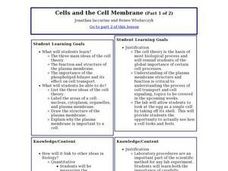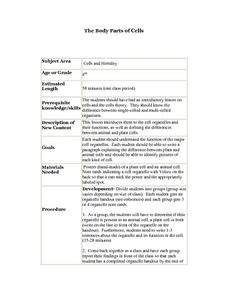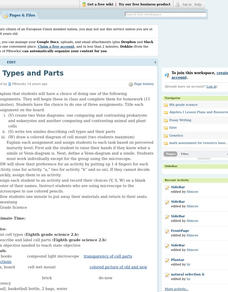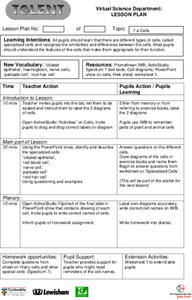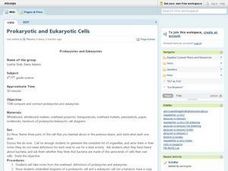Curated OER
Cell Parts
Students identify parts of a cell. For this biology lesson, students create a simulated cell by using Jell-o, fruit roll ups, raisins, gum drops, and M&M's. Students construct the simulated cell and identify each part.
Curated OER
Bread Cells
Fifth graders examine plant and animal cells. For this plant and animal cell lesson, 5th graders define what cells are, label their parts, and describe how plant and animal cells are different. They observe cells at a number of web...
Curated OER
The Cell
Students visualize plant and animal cells, explain the parts of a cell and their functions and distinguish plant cells from animal cells. Working Students, in groups, must present a particular portion of a cell to the entire class.
Curated OER
Parts of the Flower and Pollination
Students review the parts of the plant and recognize the parts that are important for pollination. For this pollination lesson, students illustrate and label the parts of a flower. Students compare different types of flowers.
Curated OER
Cells and the Cell Membrane
Students investigate the properties of cell membranes by isolating the membrane surrounding chicken eggs. They set up an experiment by placing eggs in a vinegar solution for three days. A powerpoint lecture emphasizes the structure of...
Curated OER
Cell Structure and Function
Tenth graders define and identify the cell membrane functions and structures. They study cell membrane properties" lipid bilayer" and explore cells under the microscope. They draw what they see, label any parts they can identify, and...
Curated OER
Cell Types and Parts
Eighth graders, after creating a Venn Diagram comparing/contrasting animal and plant cells, writing ten similes describing cell types, or drawing a colored diagram of a cell, list cell types as well as describe and label cell parts. They...
Curated OER
The Body Part of Cells
Eighth graders are introduced to cell organelles and their functions and the they define the differences between animal and plant cells. They write a paragraph explaining the difference between plant and animal cells and students...
Curated OER
Memorable Cell Membrane
Learners investigate the components of a cell membrane. In this cell membrane lesson plan, students build a cell membrane model using toothpicks and candy to represent the parts of the membrane including the phospholipid bilayer and the...
Curated OER
Cells, Cells, Cells
Students explore plant and animal cells. Using household items, students create a three-dimensional model of a plant or animal cell. Students identify and label each cell part.
Curated OER
Cell-O
Young scholars create model cells using gelatin, toothpicks, and various fruits to represent organelles. Then, students observe their models and complete a Venn Diagram comparing and contrasting plant and animal cells.
Curated OER
Cells: Nature's Building Blocks
What you will find on this page is the general outline of a unit on the use of a microscope and the structure of the cell. There is no actual educational content here, so you will need to design the details of each of the four student...
Curated OER
Lesson 2: the Cell Cycle
Students explain how cells reproduce. In this biology lesson, students explain the different stages of the cell cycle. They calculate the number of new cells produced.
Curated OER
How Can We Study the Differences in Animal and Plant Cells Using the Compound Microscope?
Students examine their cheek cells with a compound microscope. They identify different parts of the cell. They compare and contrast animal and plant cells with the microscope as well.
Curated OER
Cells All Around
Students measure the size of an epithelial cell and to estimate the number of epithelial cells in a given area of the body. After watching a video on cells, student groups perform an experiment using a microscope to view some of their...
Curated OER
Cell Organelles
High schoolers explore biology by researching living cells. For this living organism lesson, students participate in a role-playing activity in which all the high schoolers in class form one plant cell by portraying specific parts of a...
Curated OER
Cells And Their Parts
Students investigate different types and their parts. They differentiate prokaryote and eukaryote cells and create a venn diagram displaying differences or similarities. Students write ten similes related to the cells and parts of them.
Curated OER
Cells
Students explore the types of cells and their appropriate function. After observing a PowerPoint presentation, students draw diagrams of cells. Using a specified website, students identify parts of plant and animal cells. They answer...
Curated OER
Cell City
Young scholars understand how various cell parts function and how they are related to the genetic process by creating a model and symbol to depict the function of the cell parts. They research a cell part to determine function and then...
Curated OER
Seeing Cells
Learners discuss what comes to mind when they hear the term cell and discuss what a cell is in biological terms. They look at pictures of cells and color a picture of a cell diagram, writing the job of each part as they go. After the...
Curated OER
Prokaryotic and Eukaryotic Cells
Students compare and contrast prokaryotes and eukaryotes. They name the organelles that are present in prokaryotes only and identify their functions. Students label the diagrams of the prokaryotic cell and the eukaryotic cell.
Curated OER
Cell Factory
Young scholars examine the basic structures and functions of cells. They design and construct a factory cell model where each factory part corresponds to a cell part.
Curated OER
The Journey of a Red Blood Cell
Fifth graders examine how a red blood cell travels throughout the body. Using a model, they recreate the flow of blood through the heart. They also label the lungs and the differece between the blood that enters the heart and the blood...
Curated OER
The Incredible, Edible Cell
Students discover organelles and the functions organelles perform in cells. For this biology lesson, students create model cells using Jell-o, then dissect their "cell" to examine the parts that create a cell. Students create a diagram...




